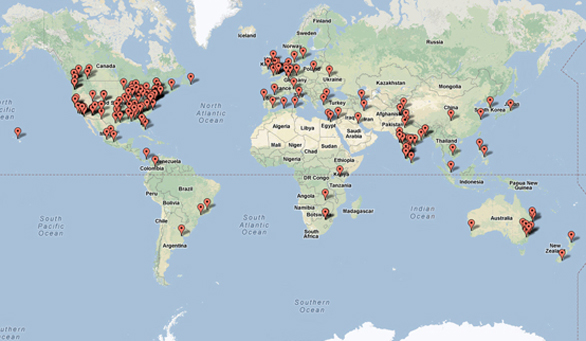
Location of TED Conversations started in the past 30 days, based on member profiles.
TED Conversations is a unique space where any member of the TED.com community can get feedback on an idea, pose an interesting question, or start a fascinating debate with fellow TEDizens from around the globe. We’ve seen participants from Columbia to Palestine, Sudan to Nepal—a total of 114 countries in just the past 30 days. See just where above. And below, a sampling of the discussions happening in this global community:
Seigi Karasaki, from Tokyo, Japan, asks: Do people deserve to know the truth, even if it isn’t in their best interest?
Is truth always the best choice of action? In “On the Decay of the Art of Lying,” Mark Twain argues:
“Lying is universal–we all do it; we all must do it. Therefore, the wise thing is for us diligently to train ourselves to lie thoughtfully, judiciously; to lie with a good object, and not an evil one; to lie for others’ advantage, and not our own; to lie healingly, charitably, humanely, not cruelly, hurtfully, maliciously; to lie gracefully and graciously, not awkwardly and clumsily; to lie firmly, frankly, squarely, with head erect, not haltingly, tortuously, with pusillanimous mien, as being ashamed of our high calling. Then shall we be rid of the rank and pestilent truth that is rotting the land; then shall we be great and good and beautiful, and worthy dwellers in a world where even benign Nature habitually lies, except when she promises execrable weather.”
What are your thoughts?
From Kamloops, Canada, David Johnson responds to Stewart Brand’s provocative de-extinction talk: Science is developing the tools towards de-extinction of species on the planet that have become extinct. The question becomes; Should we?
Stewart Brand: The dawn of de-extinction. Are you ready? Stewart Brand and his colleagues are at the biotech precipice of reviving extinct species. The Revive and Restore project plans to not only bring species back but restore them to the wild, as well as protect currently endangered species.
I don’t think any of us will have a problem with the latter, this discussion is focused on the primary goal; reintroduction of extinct species. We are not talking about dinosaurs, but the Passenger Pigeon, Carolina Parakeet, Heath Hen, Bucardo, the Taz Tiger, etc.
Up for debate here: Should we?
And Pabitra Mukhopadhyay, from Kolkata, India, invites us to consider a thought-provoking linguistics question: He, she or s/he? Should languages be made gender neutral or be left on their own to preserve literary integrity?
Feminists have long argued that sexist language can have real world consequences for gender relations and the relative status of men and women, and recent research suggests that grammatical gender can shape how people interpret the world around them along gender lines.
But language is as much a communication tool as literature. Some argue that steward and stewardess are distinct but equal terms and dropping one for another takes away the beauty of literary expression.
Interestingly there are a number of genderless languages—they have no grammatical gender but have specific words to recognize gender. There are also natural gender languages which have evolved through a constant process on conscious neutralization of grammatical genders.
Things start to get serious when studies of Jennifer L. Prewitt-Freilino, T. Andrew Caswell and Emmi K. Laakso on the gendering of languages come to fore. After investigating 111 languages of the world, their findings suggest that countries where gendered languages are spoken show less gender equality compared to countries with other grammatical gender systems. Furthermore, countries where natural gender languages are spoken demonstrate greater gender equality, which may be due to the ease of creating gender symmetric revisions to instances of sexist language. Norway and Sweden show Global Gender Gap Indices of .82 and .81 (1 being ideally gender equal) and both these countries have natural gender languages. Yemen scores a GGG index of .46 with a gendered language.
Do you agree with this co-relation?
With 237 open discussion topics, join us in tackling more big ideas, questions, and debates on TED Conversations»
Comments (6)